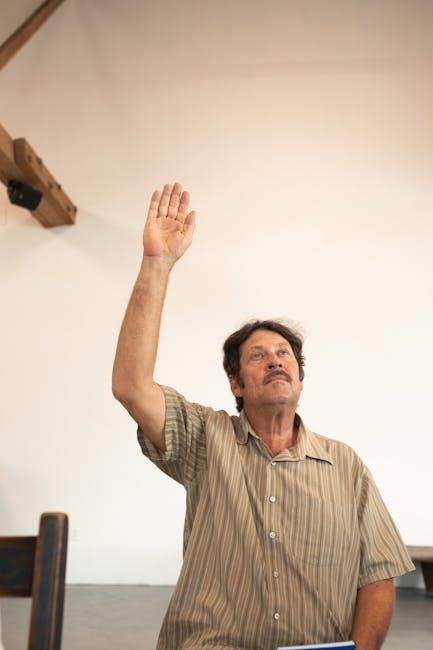A comprehensive guide to acing teacher interviews‚ this PDF offers insights into common questions‚ sample answers‚ and tips to showcase your skills and passion for teaching effectively.
1.1 Why Prepare for Teacher Interviews?
Preparing for teacher interviews is crucial to stand out in a competitive field. It helps familiarize yourself with common questions‚ allowing you to showcase your teaching philosophy‚ classroom management skills‚ and adaptability. A well-prepared response demonstrates professionalism and confidence‚ key traits for educators. Additionally‚ preparation enables you to highlight your strengths‚ such as lesson planning and student engagement strategies. By reviewing potential questions and practicing answers‚ you can present a clear vision of your teaching style and how you contribute to student success. This readiness ensures a compelling and memorable interview performance.
1.2 Benefits of Using a PDF Guide
A PDF guide provides a convenient and organized resource for preparing for teacher interviews. It offers a comprehensive collection of common questions and sample answers‚ enabling you to practice and refine your responses. The portability of a PDF allows you to access it anytime‚ making it ideal for last-minute reviews. Additionally‚ it serves as a valuable reference for understanding the types of questions you may encounter‚ helping you present your skills and experiences confidently and effectively during the interview process.
1.3 Overview of Common Questions and Answers
This section outlines the most frequently asked teacher interview questions‚ covering topics such as teaching philosophy‚ classroom management‚ and student engagement. It also provides sample answers to help candidates prepare confidently. Questions range from general inquiries about teaching motivations to specific scenarios‚ like handling disputes or assessing student progress. The guide ensures a well-rounded preparation by addressing diverse topics and offering practical strategies to articulate responses effectively during the interview process.

Most Common Teacher Interview Questions
This section covers essential questions about teaching philosophy‚ classroom management‚ and lesson planning‚ offering practical strategies and sample answers to help candidates excel in their interviews.
2.1 General Questions About Teaching
General questions about teaching are foundational‚ often focusing on your motivation‚ philosophy‚ and suitability. Examples include‚ “Why do you want to teach?” and “What makes you a good fit for this school?” These questions assess your passion‚ commitment‚ and alignment with the institution’s values. They also explore your educational background and teaching philosophy. Being prepared with concise‚ reflective answers is crucial‚ as these questions set the tone for the interview and demonstrate your understanding of the teaching profession and its challenges.
2.2 Classroom Management and Student Engagement
Classroom management and student engagement questions assess your strategies for maintaining order and fostering participation. Examples include‚ “How would you handle a dispute with a teaching assistant?” or “How do you manage a diverse classroom?” These inquiries evaluate your ability to create an inclusive environment and engage students. Highlighting specific techniques‚ such as clear expectations or interactive activities‚ demonstrates your effectiveness in promoting learning and behavior. Preparation with practical examples is key to showcasing your classroom leadership skills and adaptability in challenging situations.
2.3 Questions About Lesson Planning and Delivery
Interviewers often ask about your approach to lesson planning and delivery to gauge your creativity and adaptability. Questions like‚ “How do you structure engaging lessons?” or “How do you differentiate instruction?” highlight your ability to meet diverse student needs. Emphasize your use of educational standards‚ technology integration‚ and hands-on activities. Showcase how you assess student understanding and adjust your methods accordingly. Highlighting specific examples from your experience demonstrates your effectiveness in delivering impactful lessons and fostering student growth.
How to Prepare for a Teacher Interview
Research the school‚ practice responses to common questions‚ and review a PDF guide to refine your teaching philosophy‚ classroom strategies‚ and student engagement techniques effectively.
3.1 Researching the School and Position

Researching the school and position is crucial for a successful teacher interview. Understanding the school’s mission‚ values‚ and curriculum helps tailor your responses. Review their website‚ recent news‚ and social media to gain insights into their culture and priorities. Familiarize yourself with the specific role’s responsibilities and how it aligns with your skills. This preparation enables you to ask informed questions and demonstrate how your teaching philosophy and methods match the school’s goals‚ showcasing your enthusiasm and fit for the position effectively.
3.2 Practicing Responses to Common Questions
Practicing responses to common teacher interview questions is essential for confidence and clarity. Review frequently asked questions‚ such as “Why do you want to teach?” and “How do you manage a classroom?” Use a PDF guide to access sample answers and structure your responses effectively. Engage in mock interviews or record yourself to refine your delivery. Tailor your answers to align with the school’s mission and emphasize your teaching philosophy‚ classroom strategies‚ and student-centered approaches to stand out as a prepared and passionate candidate.
3.3 Using a PDF Guide for Effective Preparation
A PDF guide is an invaluable tool for preparing for teacher interviews. It provides a centralized resource with common questions‚ sample answers‚ and tips to help you structure your responses. Accessible anytime‚ the guide allows you to practice and refine your answers‚ ensuring clarity and confidence. Many PDF guides include 35-50 questions‚ covering topics like classroom management‚ lesson planning‚ and student engagement. Use it to tailor your answers to the school’s specific needs‚ demonstrating your adaptability and passion for teaching. This resource is perfect for mock interviews or self-recording sessions to polish your delivery.

Key Qualities and Skills to Highlight
Highlighting passion for teaching‚ classroom management skills‚ and adaptability is crucial. Showcase inclusivity‚ creativity‚ and commitment to student growth to demonstrate your effectiveness as an educator.

4.1 Demonstrating Passion for Teaching
Demonstrating passion for teaching is essential to stand out in interviews. Share your personal mission statement‚ highlighting why you chose this career and how you inspire students. Discuss your dedication to student growth‚ creativity‚ and adaptability in the classroom. Provide examples of how you engage learners and foster a love for learning. Emphasize your commitment to continuous improvement and your enthusiasm for making a positive impact. Showcasing genuine passion will help you connect with the interview panel and highlight your dedication to education.

4.2 Showcase Classroom Management Skills
Highlighting your classroom management skills is crucial during interviews. Discuss strategies like setting clear expectations‚ using positive reinforcement‚ and fostering a respectful environment. Share examples of how you maintain student engagement and handle challenging behaviors. Emphasize your ability to create a structured yet inclusive classroom‚ ensuring all students feel safe and supported. Demonstrate how you adapt your approach to meet diverse needs‚ showcasing your effectiveness in promoting productivity and respect. This will illustrate your capability to manage a classroom successfully and create a positive learning atmosphere;
4.3 Highlighting Adaptability and Inclusivity
Adaptability and inclusivity are key qualities for modern educators. Showcase your ability to cater to diverse learning styles and needs. Discuss strategies like differentiated instruction and assistive technologies to ensure all students thrive. Emphasize your commitment to creating an inclusive classroom environment where every student feels valued and supported. Highlight experiences where you adapted lessons to meet the needs of students from varied backgrounds or with special needs. This demonstrates your flexibility and dedication to fostering an equitable learning space for all.
Sample Questions and Answers
This section provides common teacher interview questions and sample answers‚ helping you prepare effectively. It covers topics like teaching philosophy‚ student assessment‚ and classroom management strategies.
5.1 Why Do You Want to Be a Teacher?
This question assesses your passion and commitment to education. Emphasize your desire to inspire and make a positive impact on students’ lives; Highlight personal experiences that led you to teaching‚ such as influential mentors or a love for learning. Showcase your dedication to fostering growth and helping students achieve their potential. Be genuine and specific about what motivates you to pursue this fulfilling career.
5.2 How Do You Assess Student Progress?
Assessing student progress involves using formative and summative methods. Formative assessments‚ like quizzes and class discussions‚ monitor learning throughout lessons. Summative assessments‚ such as tests and projects‚ evaluate overall understanding at the end of a unit. Additionally‚ observing student participation and reviewing assignments provides valuable insights. By analyzing data from these assessments‚ teachers can identify strengths‚ areas for improvement‚ and adjust instruction to meet individual needs‚ ensuring each student progresses toward their learning goals effectively.
5.3 Describe Your Teaching Philosophy
My teaching philosophy centers on creating a student-centered‚ inclusive environment that fosters curiosity and critical thinking. I believe in tailoring instruction to meet diverse learning needs‚ promoting engagement through interactive and real-world applications. Building strong relationships and encouraging creativity are cornerstone principles. I adapt my methods to ensure all students feel valued and supported‚ focusing on their social‚ emotional‚ and academic growth. I also emphasize the importance of continuous learning for both students and educators‚ integrating technology to enhance teaching and learning experiences.

What to Expect During the Interview
Expect a mix of behavioral‚ situational‚ and technical questions. Panels may include educators and students. Be ready for follow-ups and demonstrations of your teaching philosophy and methods.

6.1 Types of Questions Asked
During a teacher interview‚ expect a variety of questions‚ including general inquiries about your teaching philosophy‚ behavioral questions about classroom management‚ and situational questions assessing how you handle challenges. Technical questions may focus on lesson planning and student assessment. Additionally‚ questions about your adaptability‚ inclusivity‚ and passion for teaching are common. Some interviews may also include questions from a student panel‚ allowing them to gauge your approachability and engagement style. Follow-up questions may delve deeper into your responses‚ requiring concise and thoughtful answers.
6.2 Role of the Student Panel in Interviews
The student panel plays a unique role in teacher interviews‚ offering a student-centric perspective. They often ask questions to gauge your approachability‚ teaching style‚ and ability to engage learners. Questions may focus on how you make lessons relatable‚ handle student concerns‚ or create an inclusive environment. Their involvement helps the interview committee assess your capacity to connect with students and understand their needs‚ fostering a more holistic evaluation of your suitability as an educator. This adds a valuable dimension to the selection process.
6.3 Follow-Up Questions and Next Steps
After the interview‚ follow-up questions may be asked to clarify your responses or explore specific scenarios. It’s crucial to remain attentive and provide thoughtful answers. Next steps often include a timeline for the hiring decision and potential further evaluations. Sending a thank-you note or email reaffirms your interest and professionalism. Understanding these steps ensures you’re prepared for what comes next‚ demonstrating your commitment to the role and the school community. This process is vital in securing a positive outcome.
Tips for Acing the Interview
Exude confidence‚ maintain professionalism‚ and engage actively with the panel. Prepare thoughtful questions to ask them‚ showing genuine interest in the role and school community.
7.1 Confidence and Professionalism
Confidence and professionalism are key to making a strong impression during a teacher interview. Maintain eye contact‚ use a firm handshake‚ and speak clearly. Show enthusiasm for teaching and highlight your strengths; Dress appropriately to reflect the school’s culture. Be prepared to discuss your qualifications and experiences with conviction. Demonstrating confidence shows that you are capable and ready to take on the responsibilities of the role. Professionalism reinforces your commitment to education and your students’ success. This combination helps build trust with the interview panel and sets a positive tone for the conversation. By presenting yourself as both confident and professional‚ you can effectively showcase your suitability for the position and increase your chances of a successful outcome.

7.2 Asking Questions to the Interview Panel
Asking thoughtful questions to the interview panel demonstrates your engagement and interest in the role. Prepare a list of questions to gauge the school’s culture‚ student needs‚ and support systems. Examples include‚ “What professional development opportunities are available?” or “How does the school foster student engagement?” This shows initiative and helps you assess the school’s alignment with your teaching philosophy. It also creates a two-way conversation‚ leaving a positive impression and aiding in your decision-making process.
7.3 Following Up After the Interview
Following up after the interview is crucial to leave a lasting impression. Send a thank-you note or email within 24 hours‚ expressing gratitude for the opportunity and reiterating your interest in the position. Highlight key points discussed during the interview to show your alignment with the school’s values. This gesture not only demonstrates professionalism but also keeps you fresh in the interview panel’s mind. Ensure your follow-up is concise‚ polite‚ and tailored to the conversation‚ reinforcing your enthusiasm for the role.